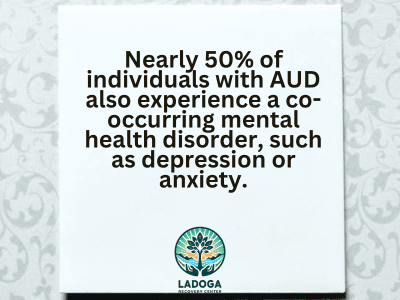Detoxification, or detox, is the process of eliminating toxic substances from the body, a critical first step in overcoming addiction. However, not all detox treatments are created equal. Alcohol detox stands apart due to the unique ways alcohol affects the body and brain. The withdrawal process for alcohol can be significantly more dangerous compared to other substances, requiring specialized care to manage potentially life-threatening symptoms. At Ladoga Recovery Center, we recognize the complexities of detox and provide tailored programs to meet each individual’s unique needs.
This detailed guide will explore how alcohol detox differs from detox for other substances, why professional care is essential, and what to expect throughout the detox process. With the right support, detox becomes the first step toward lasting recovery.
The Critical Role of Detox Treatment
Detox is often the first step in Substance Abuse Treatment and serves as the foundation for a successful recovery. While detox primarily focuses on the physical process of clearing substances from the body, it also includes managing withdrawal symptoms to ensure safety and comfort.
Detox alone does not address the underlying psychological or emotional factors that contribute to addiction. However, it prepares individuals to engage more effectively in subsequent stages of treatment, such as Residential Treatment or Inpatient Treatment, where deeper healing occurs.
Alcohol Detox: Unique Challenges and Risks
Alcohol detox presents unique challenges compared to other substances, largely due to the way alcohol impacts the brain and body. Prolonged alcohol use disrupts the central nervous system, particularly the balance of neurotransmitters like GABA and glutamate. These chemicals regulate brain activity, and their dysregulation during withdrawal can lead to severe symptoms.
1. Alcohol Withdrawal Syndrome (AWS)
Alcohol Withdrawal Syndrome is a potentially life-threatening condition that occurs when heavy drinkers abruptly stop or significantly reduce their alcohol intake. Symptoms can range from mild discomfort to severe complications such as:
- Delirium Tremens (DTs): A severe and potentially fatal condition characterized by confusion, hallucinations, agitation, and seizures. DTs typically appear 48-72 hours after the last drink but can occur up to a week later.
- Seizures: The risk of seizures is a hallmark of alcohol withdrawal, often occurring within 6-48 hours of cessation.
- Cardiac and Blood Pressure Issues: Elevated heart rate and blood pressure can lead to cardiovascular complications.
These risks make alcohol detox one of the most dangerous forms of withdrawal, requiring medical supervision to ensure safety.
How Alcohol Detox Differs from Other Substances
While detox protocols vary depending on the substance, alcohol detox stands out for its complexity and the potential severity of withdrawal symptoms. Here’s how it compares to detox for other substances:
1. Withdrawal Symptoms
- Alcohol: Withdrawal symptoms include tremors, sweating, anxiety, nausea, seizures, and DTs. Severe cases can be life-threatening without medical intervention.
- Opioids: Symptoms include muscle aches, diarrhea, vomiting, insomnia, and intense cravings. While highly uncomfortable, opioid withdrawal is rarely fatal.
- Stimulants (e.g., cocaine, methamphetamine): Symptoms are primarily psychological, including depression, fatigue, and irritability, with minimal physical risk.
- Benzodiazepines: Withdrawal symptoms are similar to alcohol, including seizures and extreme anxiety, requiring a medically supervised tapering process.
2. Medications Used in Detox
The medications used during detox vary significantly between substances:
- Alcohol Detox: Benzodiazepines are the primary medications used to manage withdrawal symptoms, prevent seizures, and reduce agitation. Other medications, such as anticonvulsants, beta-blockers, and thiamine (Vitamin B1), are often used to address complications and prevent neurological damage.
- Opioid Detox: Medications like methadone and buprenorphine are used to reduce withdrawal symptoms and cravings. Clonidine may be used to manage symptoms like sweating and anxiety.
- Stimulant Detox: No FDA-approved medications exist for stimulant detox; treatment focuses on supportive care and managing psychological symptoms.
- Benzodiazepine Detox: Gradual tapering under medical supervision is essential to avoid severe withdrawal symptoms like seizures.
3. Timeline of Withdrawal Symptoms
The timeline for withdrawal symptoms also varies:
- Alcohol: Symptoms typically begin 6-12 hours after the last drink, peak around 48-72 hours, and may last up to a week or longer for severe cases.
- Opioids: Withdrawal peaks within 48-72 hours and subsides within a week, though some symptoms, like cravings, can persist.
- Stimulants: Withdrawal can last several weeks, with mood-related symptoms like depression lingering the longest.
- Benzodiazepines: Symptoms may last weeks or even months, depending on the duration and intensity of use.
4. Risk of Complications
Alcohol detox carries a higher risk of life-threatening complications compared to most other substances. For example, stimulant detox rarely involves medical emergencies, whereas alcohol detox requires constant monitoring to prevent seizures, DTs, and cardiac issues.
Why Professional Care is Essential for Alcohol Detox
The risks associated with alcohol withdrawal underscore the importance of seeking professional help. At Ladoga Recovery Center, our detox programs are designed to ensure safety, comfort, and a seamless transition to further treatment.
1. Medical Monitoring
Detoxing from alcohol at home is dangerous and can lead to fatal complications. Our medical team provides 24/7 monitoring to manage withdrawal symptoms, administer medications, and address emergencies promptly.
2. Symptom Management
Our team uses evidence-based protocols to minimize discomfort during detox. Medications like benzodiazepines, anticonvulsants, and beta-blockers are carefully administered to stabilize patients and prevent complications.
3. Nutritional Support
Alcohol abuse often leads to nutrient deficiencies, particularly in thiamine (Vitamin B1), which is critical for brain function. We provide nutritional support to promote physical recovery and prevent complications like Wernicke’s encephalopathy.
4. Emotional Support
Alcohol detox can be emotionally challenging, with symptoms like anxiety, depression, and irritability. Our team provides compassionate care, including counseling and therapy, to help individuals navigate these challenges.
5. Transition to Further Care
Detox is only the first step in the recovery process. After completing detox, individuals can transition to Residential Treatment or Inpatient Treatment at Ladoga Recovery Center, where they address the underlying causes of addiction and build the skills needed for lasting recovery.
Detox for Other Substances
While alcohol detox presents unique challenges, detox for other substances also requires specialized care:
Opioid Detox
Opioid detox involves intense physical symptoms like muscle aches, nausea, and sweating, but these are rarely life-threatening. Medications like methadone and buprenorphine are used to ease symptoms and reduce cravings.
Stimulant Detox
Stimulant detox primarily involves psychological symptoms, such as depression, fatigue, and irritability. Treatment focuses on supportive care and addressing mental health challenges.
Benzodiazepine Detox
Benzodiazepine detox is similar to alcohol detox in its severity and risks, requiring a slow tapering process under medical supervision to avoid seizures and other complications.
The Ladoga Recovery Approach
At Ladoga Recovery Center, we provide comprehensive care for Detox Treatment, tailored to the unique needs of each individual. Whether detoxing from alcohol or another substance, our programs emphasize safety, comfort, and preparation for long-term recovery.
Our Services Include:
- Comprehensive Assessments: A thorough evaluation of physical and mental health to create a personalized detox plan.
- 24/7 Medical Monitoring: Ensuring safety and addressing complications promptly.
- Integrated Care: Addressing co-occurring mental health conditions and nutritional needs.
- Seamless Transitions: Moving smoothly from detox to Residential Treatment or Inpatient Treatment for continued care.
Take the First Step Toward Recovery
Detoxing from alcohol or other substances is a critical and often challenging step in the recovery journey. At Ladoga Recovery Center, we provide the expertise, compassion, and support needed to navigate this phase safely and effectively. Whether you or a loved one is struggling with Alcohol Addiction Treatment or another form of substance abuse, we’re here to help.
Contact us today at (866) 609-8454 or visit our website at Ladoga Recovery Center to learn more about our detox programs and start your journey to a healthier, addiction-free life.
FAQ on Treatment for Alcohol Differs
Why is alcohol detox more dangerous than detox for other substances?
Alcohol detox can cause life-threatening complications such as seizures, delirium tremens (DTs), and cardiac issues, requiring medical supervision for safety.
What are delirium tremens (DTs)?
DTs are a severe form of alcohol withdrawal that can cause confusion, agitation, hallucinations, and seizures. It typically occurs 48-72 hours after the last drink and requires immediate medical attention.
How long does alcohol detox take?
Alcohol detox usually lasts 5-7 days, with symptoms peaking around 48-72 hours. Severe cases may require extended monitoring.
What medications are used during alcohol detox?
Benzodiazepines are commonly used to manage withdrawal symptoms and prevent seizures. Other medications, such as beta-blockers and anticonvulsants, may also be prescribed.
How does alcohol detox compare to opioid detox?
While opioid detox causes intense physical symptoms, it is rarely life-threatening. Alcohol detox carries higher risks, such as seizures and DTs, making medical supervision critical.
Can I detox from alcohol at home?
Detoxing from alcohol at home is not recommended due to the potential for severe and life-threatening withdrawal symptoms. Professional care ensures safety and comfort.
What happens after alcohol detox?
After detox, individuals typically transition to Residential Treatment or Inpatient Treatment to address the underlying causes of addiction and develop strategies for long-term recovery.


